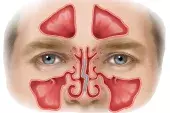Septoplasty shown to be more effective than medical treatment for nasal deviation
By Rebecca Jenkins
Septoplasty for nasal obstruction associated with septal deviation is more effective than nasal steroid and saline sprays for improving symptoms and quality of life, a UK randomised controlled study finds.
The Nasal Airways Obstruction Study (NAIROS) was designed to provide definitive evidence and recommendations for the clinical effective ness of septoplasty, the study authors wrote in the BMJ.
The multicentre, nonadaptive, open label randomised controlled trial was conducted in 17 UK hospitals and recruited 378 adults (mean age 40 years) newly referred to otolaryngology clinics with nasal obstruction symptoms associated with septal deviation.
All patients had at least a moderate level of symptoms, with a presenting Nasal Obstruction and Symptom Evaluation (NOSE) score of 30 or more out of 100.
They were randomised 1:1 to receive either surgical inter vention (188) or medical management (190) with nasal steroid and saline spray for six months, stratified by sex and baseline symptom severity.
For the surgical management group, it was left to the individual surgeon’s discretion whether they also performed unilateral inferior turbinate surgery with the septoplasty. At six months, researchers found patients who underwent septoplasty had greater improvement in nasal obstruction and quality of life, according to the patient reported outcome measure, the Sino-Nasal Outcome Test-22 (SNOT-22).
The average SNOT-22 scores at six months were 19.9 in the septoplasty group and 39.5 in the medical management group, indicating a 20-point improvement for those who underwent surgery.
More than 80% of patients at baseline had NOSE scores in the severe or extreme category of symptoms, the researchers noted, with subgroup analysis finding these patients showed the greatest symptom improvement.
Readmission to hospital with bleeding after septoplasty occurred in seven participants (4% of 174 who had septoplasty), and a further 20 participants (12%) required antibiotics for infections.
‘Adults presenting with nasal obstruction associated with a deviated nasal septum, in the absence of coexistent nasal or sinus disease and with a baseline NOSE score >30, can reliably be offered surgery,’ the authors recommended.
Associate Professor Larry Kalish, Head of the ENT Department at Concord Hospital in Sydney, said the study provided a good level of evidence showing the benefits of surgery, adding the effects could be even greater than demonstrated in the trial.
‘The impressive part of this study for me was that septoplasty alone or with mucosal preserving turbinate surgery on one side only was clearly better than medical treatment,’ he told Medicine Today.
‘In most cases in Australia, we would also perform turbinate surgery and often mucosal sacrificing surgery. As this is standard practice, we can assume that the surgery outcomes here would be even better than shown in the study.’
Professor Kalish added that surgical techniques were not standardised in the trial, which could also lead to researchers underestimating the effect of septoplasty.


